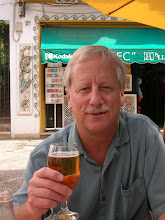I asked awhile ago why Tony Judt, the brilliant author of Postwar and other books and articles, has seemed to be absent from the public forum lately. The answer is that he has ALS. Here is a very moving description of his condition at present. This is very sad and I think everyone should read it to get some idea what this terrible disease is like. Usually, when it is diagnosed, you have a couple years to live and the end is like Mr. Judt's condition. I have enormous respect for this man's humanity and intellect even though I have never met him. I know others who have gotten such death sentences and I hope I appreciate how lucky I am not to be under one at the moment, although that is the conclusion of all life. As so I apologize for the segway into the next topic; I do not mean to minimize the tragedy of his destination. I thank him for all the erudite and stimulating words he has written. He has made my life immensely richer.
I contrast this tragedy with an insight from reading Matt Ridley's The Origins of Virtue, a wonderful book on evolutionary psychology. Mr. Judt's situation leads one to ask how could there be a Christian God. The following suggests why it is natural to think so. Ultimately, I believe that this metaphysical issue is secondary in importance. My religious friends are often the most dedicated to the common good and treat others with respect. We are on the same side. We cannot settle the metaphysical issue anyway. That is why I am an agnostic.
Why does it seem so natural for people to believe in God? It is ultimately because we evolved largely as social creatures in relatively small hunter/gatherer groups. The possibility of altruism was created by the possibility of reciprocity. I will help you now and share with you now because of the probability that you will do so in the future. People who formed such groups were more likely to survive. However, as in all Utilitarian schemes, there is the problem of the “free-rider.” An individual may say to himself “why should I risk my life or even exert effort to kill the wild animal for food if I will get it from somebody else anyway?" As a result of this problem, humans developed a highly developed unconscious device for detecting cheaters or slackers. And potential cheaters developed devices such as blushing and other facial expressions which made them readable by others in the group.
This was one of our biggest problems as small groups of hunter/gatherers. So we developed the sense that all problems are problems of agency, rather than some naturalistic cause. There were no accidents or luck. We developed beliefs about those events that were very important to us, dangerous or helpful, in terms of agency. That is, we created gods for understanding these occurrences. And we treated them as we may treat any who have power over us; we offered gifts and attempted to avoid behaviors that would antagonize the gods. We routinely anthropomorphized the natural world as a system of social exchanges.
The history of religion is one of progression from paganism, worshiping a number of gods, to monotheism, although Hinduism and some other religions do not fit this model. This hardwired ability and tendency to calculate the world as social exchanges or a social contract, keeping score of who has done what, is part of our nature. So people are naturally altruistic (they intend to do good for others for the benefit of the other) even though such a feature arose because of its success in allowing the formation of social units. Those who did not were kicked out of groups or never formed groups, and died out, not spreading their genes. Of course, these hunter/gatherer groups were limited in size due to our score-keeping limitations. The advent of larger groups or societies raises questions of what social ordering forces allowed them to exist. We must assume that the organizing forces were path-dependent, that is they are based on our instinctual nature as social animals.
Saturday assorted links
11 hours ago




No comments:
Post a Comment